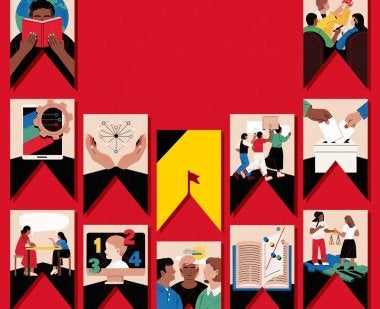
From raising literacy rates in vulnerable communities, to strengthening civic engagement, to countering the damaging effects of racism on mental health, College of Education researchers are leaders in addressing humanity’s grand challenges and shaping the future of our community, nation and world.
In February, the university recognized the college’s impactful work when it awarded 11 of its 50 Grand Challenges Grants to nearly 40 EdTerps, including in the Department of Counseling, Higher Education and Special Education; Department of Human Development and Quantitative Methodology; Department of Teaching and Learning, Policy and Leadership; Center for Educational Innovation and Improvement; and Office of the Dean. EdTerps received Grand Challenges Grants in all four categories: one Institutional Grant, four Impact Awards, four Team Project Grants and two Individual Project Grants.
The Grand Challenges Grants Program is the largest and most comprehensive program of its type in the university’s history. It reflects an institution-wide commitment to tackling critical societal issues ranging from educational disparities, to racial and social injustice, to threats to democracy, to pandemics. The grants total more than $30 million in institutional investments. Many of the teams taking on these grand challenges are interdisciplinary, bringing together expertise and perspectives from different colleges and departments across the university.
Endeavors spoke with EdTerps representing each of the college’s 11 Grand Challenges Grants.
Institutional Grant
Maryland Initiative for Literacy and Equity
Supported by one of three Institutional Grants awarded across the university, the Maryland Initiative for Literacy and Equity (MILE) aims to increase literacy in Maryland and the surrounding region through research, education, professional development, and community and policy outreach. It focuses on partnering with and addressing the needs of marginalized communities across race, culture, ethnicity and language, as well as neurodiverse populations. MILE intends to break down silos by bringing together brain and behavioral researchers, teachers, speech pathologists, librarians, policymakers, families and community members.
Q&A with Associate Professor Donald J. Bolger (Principal Investigator)
Impact Awards
Maryland Democracy Initiative
The Maryland Democracy Initiative strives to create a more fair and just society by building the capacity of all people for a lifetime of civic participation. It expands interdisciplinary, community-centered research on civic engagement; offers innovative teaching and learning opportunities; and hosts civic engagement convenings.
Q&A with Senior Faculty Specialist Lena Morreale Scott (Principal Investigator)
Maryland Initiative for Digital Accessibility
The Maryland Initiative for Digital Accessibility (MIDA) strives to change technology design research and practice so that individuals with disabilities are engaged as equal partners from the beginning of the process. This will ensure that digital technology is “born-accessible”–with accessibility proactively built in–including in the fields of education, health, employment, commerce and civic engagement. MIDA engages disability rights groups, technology companies and policymakers; develops technology projects to improve accessibility; and plans events and programs to increase awareness of digital accessibility.
Q&A with Associate Professor Gulnoza Yakubova (Co-Principal Investigator)
Pandemic Readiness Initiative
The Pandemic Readiness Initiative (PRI) aims to learn from COVID-19 and other disasters to better understand human behavior in public health emergencies and prepare for future crises. It integrates a broad array of social and behavioral sciences, including public health and risk communication, social media and other digital technologies, health literacy, health equity, public opinion, cognitive processing of messages, disaster management and cultural studies.
Q&A with Assistant Professor Sarah McGrew (Team Member)
Values-Centered Artificial Intelligence
Values-Centered Artificial Intelligence focuses on developing artificial intelligence (AI) tools, theories and practices that align with community needs, ethics and human values. The team is developing applications in fields such as education, health care, transportation, communication and accessibility.
Q&A with Assistant Professor Jing Liu (Team Member)
Team Project Grants
M-Powering Teachers: Using Machine Learning to Measure and Improve Equity in K-12 Mathematics Classrooms
This project is developing, evaluating and refining a tool called M-Powering Teachers, which uses machine learning techniques to analyze audio recordings of classrooms. The tool provides teachers with more frequent, timely feedback on their teaching practices than a human observer can deliver. This helps educators teach more equitably and support student learning. Although M-Powering Teachers has broad applications, this project focuses specifically on K-12 math classrooms and teachers’ equity-focused teaching practices.
Q&A with Assistant Professor Jing Liu (Principal Investigator)
Anti-Black Racism Initiative
This initiative strives to establish UMD as a leader in efforts to identify, disrupt and prevent anti-Black racism by fostering cross-departmental faculty-student research, offering undergraduate and graduate courses, and hosting teach-in workshops, symposia and other events for the campus and surrounding community. The initiative launched a new anti-Black racism minor in fall 2023.
Q&A with Dean Kimberly Griffin (Co-Principal Investigator)
Racial and Social Justice Research-Practice Partnership Collaborative
This collaborative addresses racial and social injustices in education through equal, mutually beneficial partnerships between faculty and staff at UMD and educators in local school districts.
Q&A with Senior Research Fellow Christine M. Neumerski (Principal Investigator)
Encuentros: A University-Community Partnership to Mitigate the Mental Health Crisis for Latino Immigrant Youth
This community-driven project addresses mental health issues among low-income Latinx immigrant youth in Maryland to increase their sense of well-being, community and belonging. Encuentros will ultimately scale up to a nationwide program.
Q&A with Associate Professor Sophia Rodriguez (Principal Investigator)
Individual Project Grants
An Innovative Intervention to Help Asian American Families Cope with Racism and Related Mental Health Difficulties
This eight-session, culturally sensitive intervention helps Asian American families talk about racism, discrimination and associated mental health issues and learn positive parenting practices and youth coping strategies.
Q&A with Associate Professor Cixin Wang (Principal Investigator)
How Does Statistical Learning Interact with Socioeconomic Status to Shape Literacy Development?
This project looks at whether explicitly teaching statistical learning (the ability to detect patterns or sequences in the environment) might reduce socioeconomic disparities in children’s literacy development.
Q&A with Professor Min Wang (Principal Investigator)



